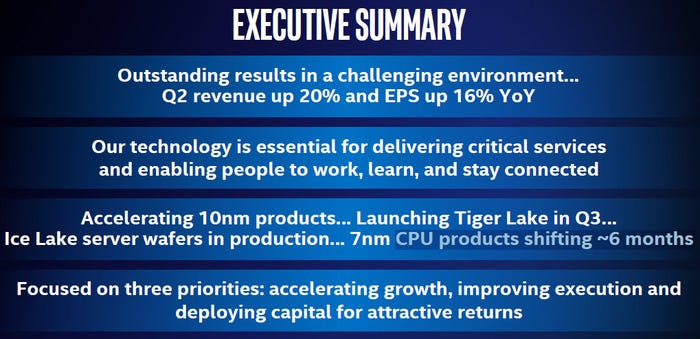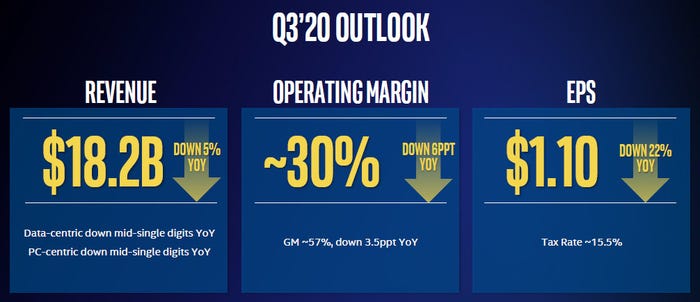Intel shares dive on continued manufacturing woesIntel shares dive on continued manufacturing woes
US chip giant Intel reported strong revenues for Q2 2020, but a downbeat outlook compounded by its continued struggles with the 7nm process drove its share price down by 12%.
July 24, 2020

US chip giant Intel reported strong revenues for Q2 2020, but a downbeat outlook compounded by its continued struggles with the 7nm process drove its share price down by 12%.
“It was an excellent quarter, well above our expectations on the continued strong demand for computing performance to support cloud-delivered services, a work- and learn-at-home environment, and the build-out of 5G networks,” said Bob Swan, Intel CEO. “In our increasingly digital world, Intel technology is essential to nearly every industry on this planet. We have an incredible opportunity to enrich lives and grow this company with a continued focus on innovation and execution.”
No arguing with that, but Intel seems to have a funny way of going about it. The executive summary below shows excellent revenue and EPS growth, but the outlook underneath it paints a totally contrasting picture. While the global slowdown caused by the coronavirus pandemic will be partly to blame, ‘7nm CPU products shifting ~6 months’ certainly won’t have helped.


“We are seeing an approximate six-month shift in our 7nm-based CPU product timing relative to prior expectations,” confessed Swan. “The primary driver is the yield of our 7nm process, which based on recent data, is now trending approximately twelve months behind our internal target. We have identified a defect mode in our 7nm process that resulted in yield degradation.
“We’ve root-caused the issue and believe there are no fundamental roadblocks, but we have also invested in contingency plans to hedge against further schedule uncertainty. We’re mitigating the impact of the process delay on our product schedules by leveraging improvements in design methodology such as die disaggregation and advanced packaging. We have learned from the challenges in our 10nm transition and have a milestone-driven approach to ensure our product competitiveness is not impacted by our process technology roadmap.”
To translate the corporate gibberish: Intel is a year behind on the production of its most advanced chips. That means PC and server vendors will also see products that depend on those chips delayed by a year, many of whom may decide to defect to AMD or Nvidia or whoever. Semiconductor specialist site is sceptical of even this concession, so it looks like this will represent Intel’s best quarter for the foreseeable future.
About the Author
You May Also Like










.png?width=300&auto=webp&quality=80&disable=upscale)


_1.jpg?width=300&auto=webp&quality=80&disable=upscale)